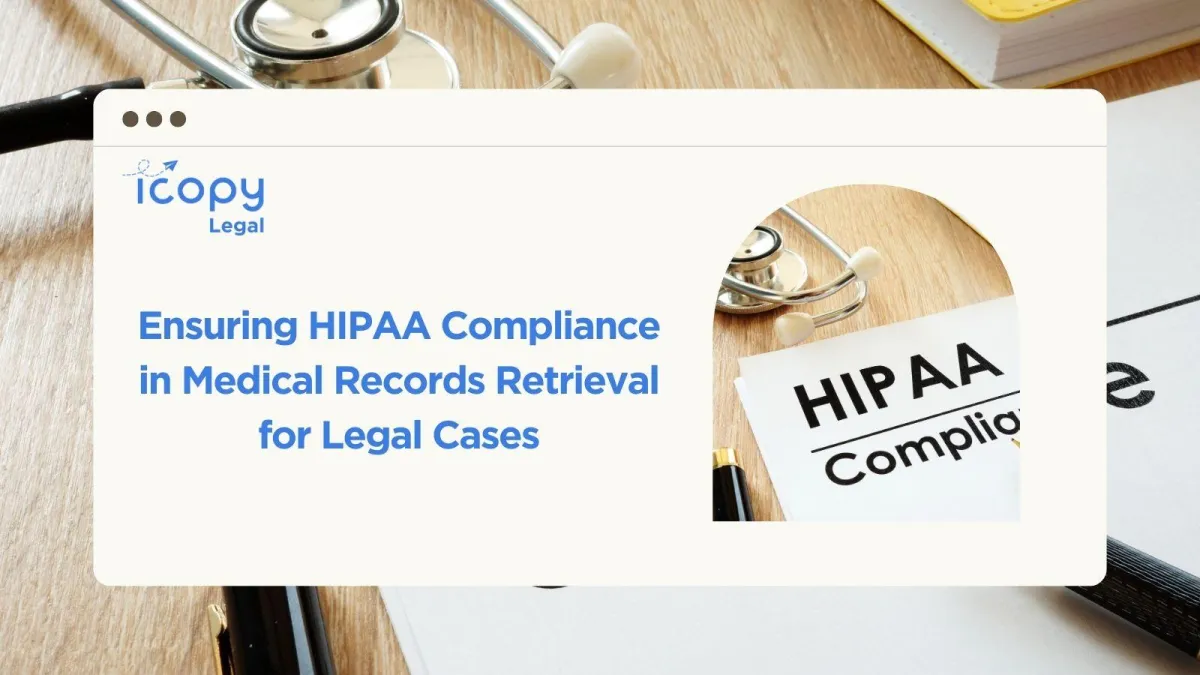Blog
Your inside news on record retrieval for legal firms - plus business tips to help scale your practice.

Ensuring HIPAA Compliance in Medical Records Retrieval for Legal Cases
Ensuring HIPAA Compliance in Medical Records Retrieval for Legal Cases
In legal cases involving medical records, ensuring HIPAA compliance is essential. Law firms must adopt stringent procedures to protect the privacy and security of Protected Health Information (PHI) while managing records. Here are key steps to ensure compliance:
1. Secure Record Storage and Transmission
HIPAA mandates that medical records must be stored and transmitted securely. Law firms handling records retrieval must ensure that they use encrypted digital systems for both storage and transfer of PHI. This applies whether the records are stored in a cloud-based system or transmitted via email or other digital platforms.
Additionally, physical records should be stored in a secure location with restricted access to prevent unauthorized viewing. For law firms, this could mean using locked file rooms or limiting digital access to authorized personnel only.
Tip: Use encryption tools for emails and digital files containing medical records, and consider partnering with records retrieval companies that prioritize secure digital storage.
2. Training Staff on HIPAA Regulations
All staff members involved in records retrieval and management should receive regular training on HIPAA requirements and best practices. This includes understanding the types of information that are considered PHI, as well as the penalties for non-compliance.
Regular training also ensures that team members know how to handle records appropriately, from maintaining confidentiality during communication with clients to securely destroying old records.
Tip: Hold quarterly training sessions to keep all staff up to date on HIPAA compliance and the latest data security protocols.

3. Audit Trails and Documentation
HIPAA requires that records retrieval systems maintain detailed audit trails that track who accesses the PHI, when, and why. This ensures that the firm can monitor all access to sensitive records and protect against unauthorized usage. Additionally, these audit logs can be crucial during legal disputes, as they provide proof that the law firm adhered to compliance standards.
Tip: Make sure your document management system includes detailed audit logs, and ensure these logs are regularly reviewed for any discrepancies.
4. Secure Disposal of Records
Once a legal case is concluded or the retention period expires, securely disposing of medical records is a critical step in maintaining HIPAA compliance. This means either shredding physical documents or ensuring that digital files are permanently deleted from systems. In many cases, failing to securely dispose of old records can lead to breaches and legal penalties.
Tip: Partner with secure document destruction services that are HIPAA compliant to handle both physical and digital record disposal.
Ensuring Compliance with iCopy Legal
At iCopy Legal, we understand the critical nature of maintaining HIPAA compliance in records retrieval. We provide secure, encrypted systems for storing and transmitting medical records, ensuring that all client data is protected throughout the legal process. Our team is fully trained in HIPAA regulations, and we use compliant practices from start to finish. By partnering with us, law firms can confidently manage medical records while minimizing the risk of violations or delays due to non-compliance.
Conclusion
Navigating HIPAA regulations in medical records retrieval is essential for any law firm involved in healthcare-related cases. By securing proper authorizations, using encrypted systems, training staff, maintaining audit trails, and securely disposing of records, firms can protect sensitive information and avoid costly penalties. iCopy Legal’s focus on compliance ensures that your records retrieval process is secure, efficient, and meets the highest regulatory standards. We are both HIPAA Complianct and SOC 2 Type 2 compliant.
Need help streamlining your HIPAA-compliant records retrieval process? Contact iCopy Legal today to see how we can support your firm with secure, efficient solutions.
Copyright © 2023 iCopy Legal

